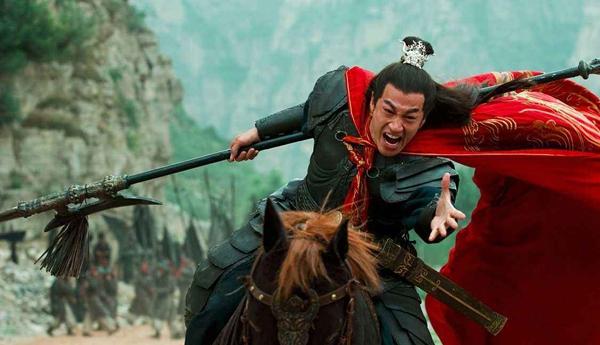Lü Buxiao was brave and good at war during the Three Kingdoms period at the end of the Han Dynasty, and was a fierce general, so his name also became synonymous with fierce generals. In the Ming and Qing dynasties, there was also a fierce general, he bravely won the three armies, and his appearance was very similar to Lü Bu, more importantly, his life trajectory was quite similar to Lü Bu, he had defected to many people, and the final outcome was also very tragic. So who is this "Lü Bu" of the Qing Dynasty?
In the TV series "Kangxi Dynasty", there is a plot in which during the San Francisco Rebellion, Wu Sangui and the Kangxi Emperor tried their best to win over a general officer in the northwest region and let him join his camp. This story is true in history, and the chief military officer of the town guarding Xiben is the living "Lü Bu" of the Qing Dynasty, nicknamed "Ma Harrier", named Wang Fuchen!

The image of Lü Bu in the film and television drama
Wang Fuchen was not originally surnamed Wang, but was surnamed Li and came from a humble origin. In the last year of the Ming Dynasty, Wang Fuchen joined Li Zicheng's rebel army because of his brother-in-law, and he also went to defect. Wang Fuchen was a "young scoundrel" who was a good gambler by nature and "lost six hundred taels of silver in one night". The brother-in-law hated that iron was not steel, and wanted to kill Wang Fuchen, but was unexpectedly killed by Wang Fuchen, after which Wang Fuchen left the rebel army and surrendered to the Army of Jiang Ou, the general of datong in the Ming Dynasty.
During this period, the Ming general Wang Jinchao admired Wang Fuchen very much, so he adopted him as a righteous son and changed his name to Yi surname. According to records, Wang Fuchen was seven feet tall, his face was white, and his "hair and eyebrows were like a reclining silkworm, like the statue of Marquis Lü Wen of the world", looking like Lü Bu. In addition, Wang Fuchen "bravely crowned the three armies, unstoppable", people called it "horse harrier".
The image of Wang Fuchen in film and television dramas
When Jiang Ou was fighting against the Qing army, "the auxiliary ministers rode on yellow horses, and when they came out of the plunder, they came and went, and there was no one who swept their edges." Even the eight flag soldiers, who had always been heroic, saw that "the yellow horse came galloping, and the horse harrier was shocked, that is, invincible." After the Qing army occupied Datong, the British prince Azig was a very important vassal and accepted him as a bodyguard around him, and at that time, both the Manchu and Han dynasties in the capital were "proud of their knowledge of horses and harriers".
Later, Wang Fuchen fought for the Qing Dynasty's southern conquest and northern war, and was once subordinate to Wu Sangui, who also admired him very much, "There are good food and beautiful clothes, others are not allowed, they will be given to auxiliary ministers." However, Wang Fuchen and Wu Sangui's nephew Wu Yingqi were at odds with each other, so he left Yunnan and was transferred to the northwest to serve as the viceroy of Pingliang. At this time, the situation was already very complicated, and Both Wu Sangui and the Kangxi Emperor co-opted Wang Fuchen.
The image of Wu Sangui in film and television dramas
After Wang Fuchen left office, Wu Sangui took his hand, cried and said, "Er to Pingliang, never forget the old man", and also gave 20,000 taels of silver as a travel fee. After Wang Fuchen arrived in Beijing, he also received courtesy from the Kangxi Emperor, "grace is frequent, rewards are repeated", and the Kangxi Emperor even rewards Wang Fuchen with the ancestral "one pair of dragon leopard tail guns". Later, the San Francisco Rebellion broke out, and initially Wu Sangui sent people to woo Wang Fuchen, but he refused.
Although Wang Fuchen served as an official in Li Zicheng, the Ming Dynasty, and the Qing Dynasty, this person was still different from Lü Bu, he was a man of temperament, initially supporting the Kangxi Emperor, but later he was forced to rebel. It turned out that the Kangxi Emperor sent the Manchu minister Mo Luo as the economic strategy, and Mo Luo did not trust the Han people, so he squeezed Out Wang Fuchen everywhere, and when he could not bear it, Wang Fuchen led an army to kill Mo Luo and raised an army to rebel.
The image of the Kangxi Emperor in film and television dramas
Afterwards, Kangxi suppressed and used it, and initially the battle was very difficult, and then he sent the general Tu Hai to march into Pingliang, only to achieve victory, and then sent people into the city to persuade Wang Fuchen to surrender. The Kangxi Emperor did not hold Wang Fuchen accountable, and still let him lead the army. However, Wang Fuchen was uneasy and eventually committed suicide by drinking poisoned wine. After the San Francisco Rebellion was settled, the Kangxi Emperor did not pursue Wang Fuchen's family.
References: 1. Draft History of the Qing Dynasty; 2. Miscellaneous Records of Guangyang
----------------------------
Taste the millennium of change, feel the cold and warm life, more wonderful, please pay attention to [5,000 years]
WeChat public account: 5,000 years